| The Governors are in Town: Politico's State
Solutions Conference
...1 of 1 > "There's a lot being accomplished at the state level." - Gov. Sam Brownback (R-KS) |
| Feb. 21, 2014 - Four governors,
in town
for the National Governors Association winter meeting, participated in
Politico's fourth annual State Solutions Conference. |
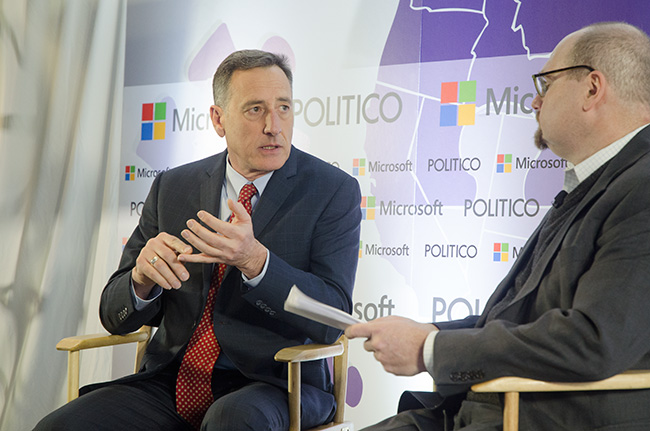 |
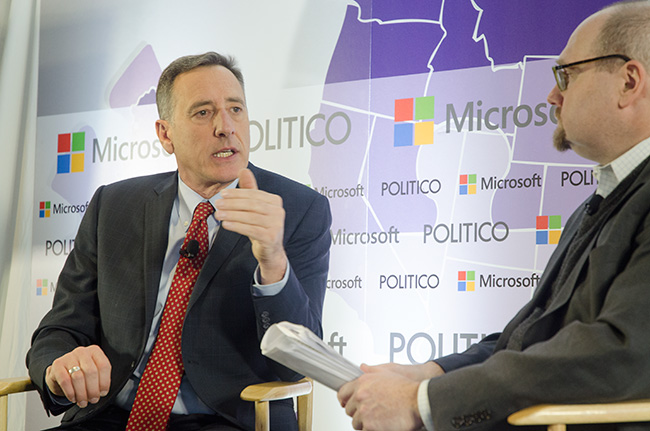 |
| First off
was Gov. Peter Shumlin (D-VT), elected in 2010, re-elected in 2012 and
now chairman
of the Democratic Governors Association. In the first part of the
interview Politico senior
White House reporter Glenn
Thrush concentrated on political questions, asking Shumlin whether
it was a mistake that the Democratic Governors Association had given
just
$7,600 to Gov. Chris Christie (R-NJ)'s Democratic challenger Barbara
Buono in the 2009 campaign.
Shumlin rejected the notion. He said that in the last nine
governor's races where both the RGA and DGA have competed, the
Democrats were outspent in all, yet won eight of those races.
Shumlin also said that the idea of Republican governors as "the
great reformers is dead." After going through some of the 2014
races, Thrush then turned to Shumlin's recent State of the State
address, asking why he had chosen to focus his speech on the problem of
heroin
and opiate addiction. Shumlin explained that Vermonters have "the
best quality of life in the country" but "this is the one thing that
could destroy it." He said the problem is "driven by FDA approved
pills" such as Oxycotin. |
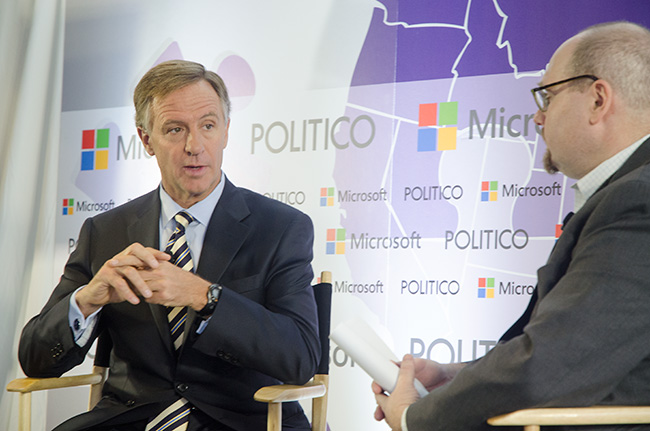 |
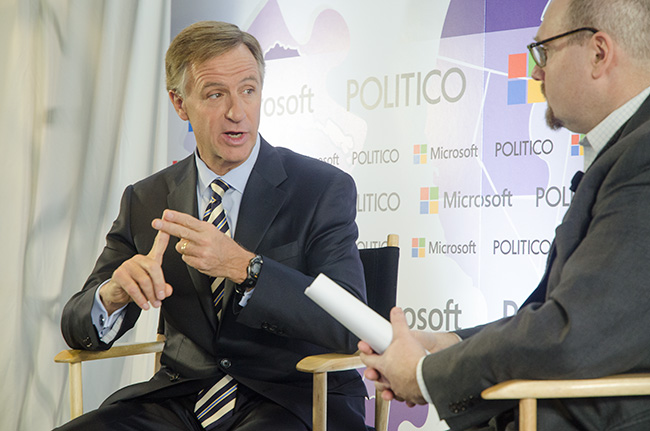 |
| Next, Thrush interviewed Gov.
Bill Haslam (R-TN), first elected in 2010, after serving as mayor of
Knoxville. Haslam is also now policy chairman of the Republican
Governors Public Policy Committee. Thrush asked whether
Haslam had gone "a little too far" in interjecting himself in the
recent
UAW vote at the VW assembly plant in Chattanooga. Haslam said he
felt compelled to act because the possibility of a new assembly line
was at stake. Asked whether he has any interest in running for
president in 2016, Haslam said he is "not considering that or planning
on that one bit." The conversation then turned to Haslam's bold
proposal, made in his State of the State address, that any graduating
high school student in Tennessee will have the opportunity to attend
two years of community college for free. While acknowledging that
it does not sound like a Republican idea, Haslam said, "We want more
opportunity for people; we want people to have the right training." |
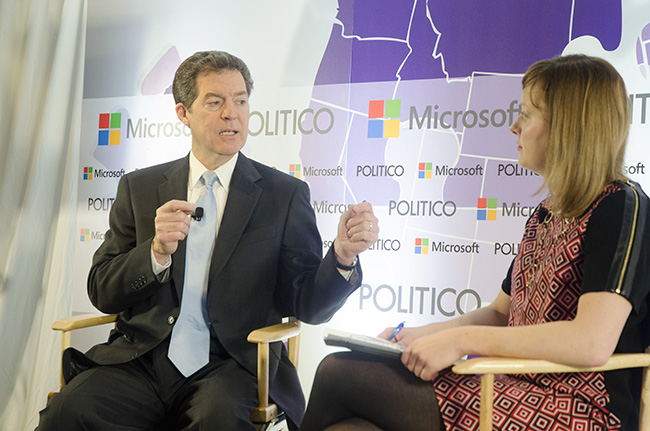 |
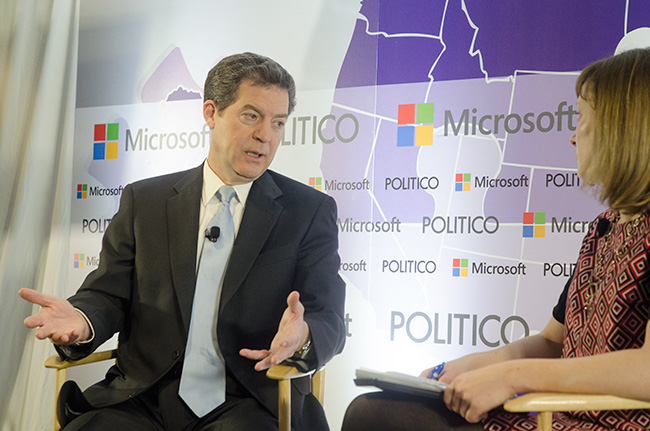 |
| Gov. Sam Brownback (R-KS),
elected in 2010 after serving in the U.S. Senate, spoke with Politico senior Washington
correspondent Anna Palmer. Brownback recounted that when he took
office Kansas had just $876 in the state general fund and faced a $500
million shortfall. "You had to change the financial trajectory,"
he said. He has reduced the number of state employees and cut
taxes, leading to growing business environment and revenues.
Asked about whether he has any interest in running for president in
2016, Brownback dismissed the idea. "I'm fully occupied," he
said. Palmer asked Brownback how Republicans can counter the
charge they are waging a "war on women." He described himself as
a "bleeding heart conservative," and noted his focus on poverty and
mental health issues. "We have a real problem with poverty in the
United States," he said. He described the Second Chance Act,
which aims to find a mentor for everyone that comes out of the Kansas
prison system after completing their sentences. Brownback said he
has made good progress on the five goals he set out in his 2010
campaign, noting improvements in three areas and a static situation in
two others. "There's a lot being accomplished at the state
level," Brownback said. Asked about the inability to get much
done at the federal level, Brownback recounted working with Sen. Paul
Wellstone (D-MN) on the issue of human trafficking when they served in
the Senate. Although the two were at opposite ends of the
ideological spectrum, on that issue they found a zone where they could
accomplish something. Brownback returned to the problem of
poverty. "What are we doing to help people out of poverty?" he
asked. The answer, he said, is getting people skills. |
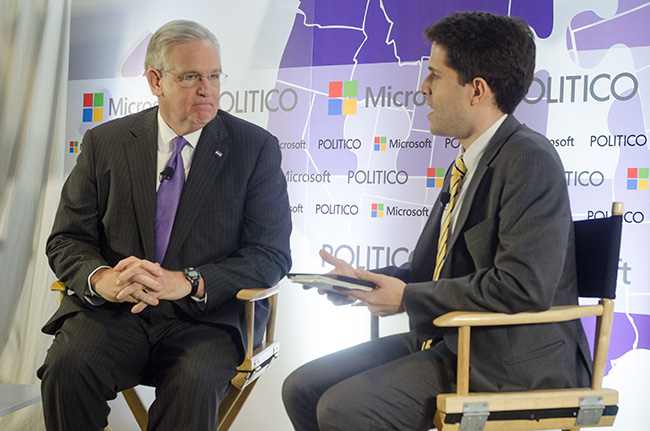 |
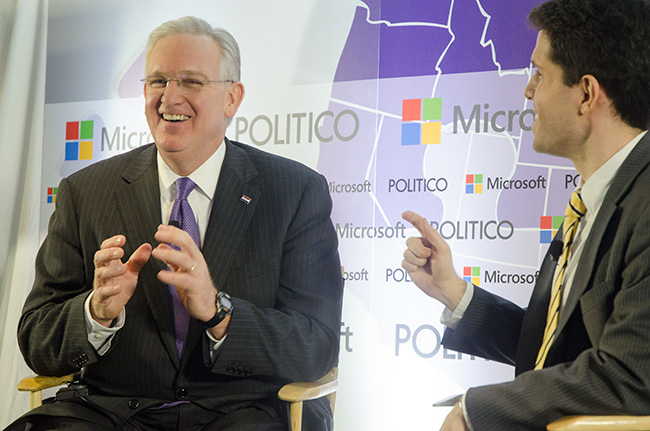 |
| Politico
senior political reporter Alex Burns interviewed Gov. Jay Nixon (D-MO),
elected in 2008 and re-elected in 2012. Nixon and other
Democratic governors had just met with President Obama at the White
House; Nixon said he found the president's "new team" reinvigorated and
reenergized. Asked how he is able to govern in a relatively
conservative state (Republicans control both chambers of the General
Assembly by more than two-to-one margins), Nixon cited shared values
and fiscal discipline and said he has worked to establish personal
relationships with as many members as he can. "You've got to meet
people where they are," he said. Nixon said the political
discourse in Washington is becoming "less and less relevant."
Asked about 2016, Nixon said, "We're all hopeful that Secretary Clinton
makes a run, and if she does
we'd be prepared to help make sure she got electoral votes of the Show
Me state." Nixon said she has "a wealth of experience and a deep
commitment to public service." (Politico
posted a video clip titled "Jay Nixon won't rule out 2016 run").
Asked about Obamacare, Nixon again cited the need to "engage people
where they are." For example, he said, when considering people
who work low wage jobs, "by golly they deserve health care as much as
anybody else." Nixon recounted working on a bill to provide
autism coverage in his first year, only to see it fail. He came
back the next year and "we got it done." It is a question of
"which key is going to turn the lock," Nixon said. |
| back > |

